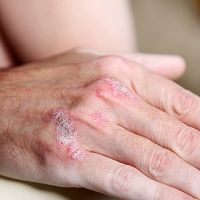Article
Scientists Identify Mechanism of Action of Potential Psoriasis Therapy
Author(s):
Researchers in Germany have figured out the process by which interleukin 4 (IL-4) inhibits inflammation, pointing the way toward a possible treatment for psoriasis, psoriatic arthritis, and other autoimmune diseases.

Researchers from Technische Universität München and the University of Tübingen in Germany have published study results demonstrating the mechanism of action of interleukin 4 (IL-4) and its role in inhibiting inflammation.
According to a news release from Technische Universität München, Tilo Biedermann, MD, chair for Dermatology and Allergology and director of the Clinic and Polyclinic for Dermatology and Allergology, and colleagues used human and mouse cells to “unravel the molecular effects of IL-4 on inflammation,” and discovered that IL-4 “inhibits specific immune cells in a natural way: it prevents the cells from synthesizing and releasing two signaling molecules, known as IL-23 and IL-17.”
This discovery was important because, according to Biedermann, “before IL-4 can be used as a standardized medication, we have to understand the exact mechanism of action… “The discovery is very interesting in that IL-23 activates special T-cells in the body, thus triggering inflammation. Evidently IL-4 is able to effectively block this pathway.”
The researchers also found that administration of IL-4 specifically inhibits inflammation of the skin via this mechanism.
To test these findings in humans, the researchers administered subcutaneous injections of IL-4 to 22 patients with psoriasis over a period of six weeks, and then compared samples from the patients’ affected skin areas to samples taken at baseline.
The effect was dramatic. Before treatment with IL-4, the study participants had “high levels of IL-23 and IL-17 in their inflamed and itchy skin.” After treatment, IL-23 and IL-17 “were barely detectable” and the patients’ “inflammation and psoriatic skin changes had disappeared,” according to the news release.
These study results “show that IL-4 very selectively and successfully suppresses inflammation. This therapeutic approach could therefore be very interesting for the treatment of other autoimmune diseases,” said Biedermann. “Moreover, we now have a better understanding of how IL-4 functions as an important ‘checkpoint’ in the immune system and will be able to better appreciate and exploit its significance in the future.”
The study results were published in PNAS in an article titled “IL-4 abrogates TH17 cell-mediated inflammation by selective silencing of IL-23 in antigen-presenting cells.”





